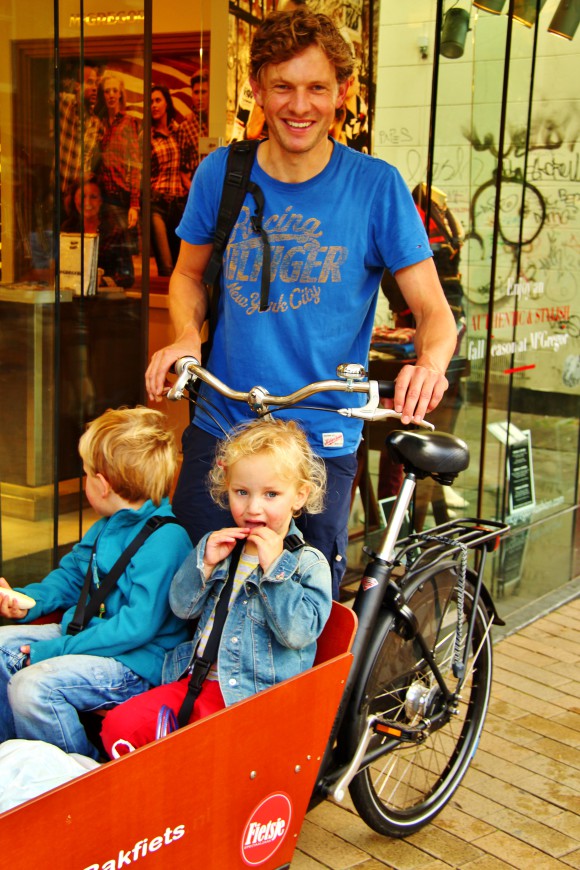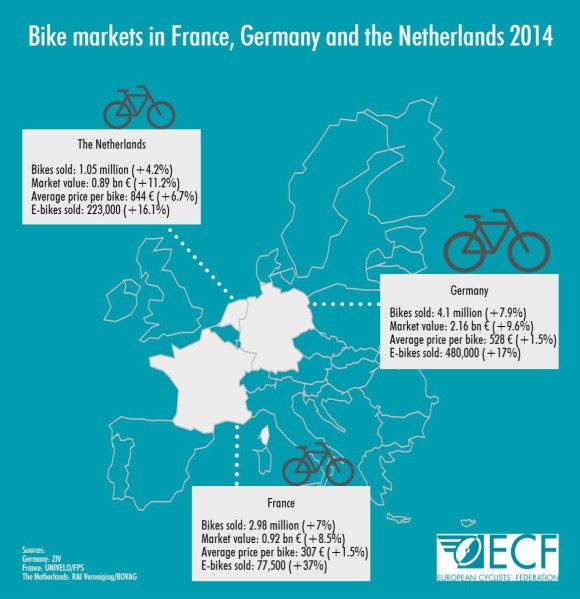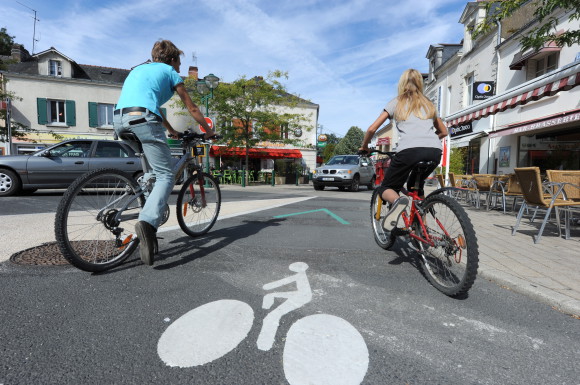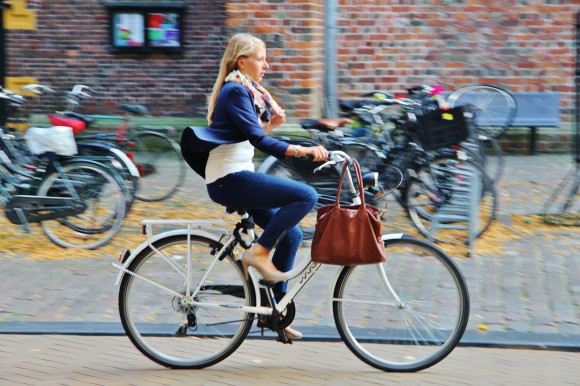
Cycling sells: Three of EU’s biggest markets see substantial increase in bike sales in 2014
Cycling is on the upswing in Europe, and so are bike sales: France, Germany and the Netherlands, three of the biggest bike markets in the EU, have seen market values increase by 8% to 11% in 2014. What is more, the average price per bike has gone up in all three countries, with pedelecs and e-bikes being a major driver for the upswing.
In France, according to the sales figures released by UNIVELO and FPS, sales in volume have increased by 7% compared to 2013. The number of sold bikes reached 2.98 million, while the average price per bike increased by 1.5% to € 307. The market value was estimated at € 919 million, which is an impressive surge of 8.5% compared to 2013. 77,500 bikes with electric assistance were sold, 37% more than in 2013. The dynamism of the French market shows that cycling is becoming “en vogue” again in the land where bikes are called “La petite reine”, the little queen. It is therefore only logical that this year’s Velo-city conference is going to take place in Nantes, one of France’s forerunner cities when it comes to cycling.
Sales increased even more in Germany, where 4.1 million bikes were sold in 2014 – a growth rate of almost 8% compared to 2013. The figures released by the German two-wheeler industry federation (ZIV) also show that the average price per bike reached € 528, 1.5% more than the year before. Taken together, these numbers add up to a market value of € 2.16 billion, with a remarkable yearly growth rate of 9.6%. As in France, growth in the e-bike market was even higher, reaching 480,000 units sold and a growth rate of 17%. This means that the number of e-bikes and pedelecs on German streets has now surpassed the threshold of 2 million units – more than 100 times the number of registered e-cars.
 Also the Netherlands have experienced a solid growth in their bike market in 2014. According to statistics released by sector organisations RAI and BOVAG, sales increased by 4.1% in volume to 1.05 million bikes. Thanks to an increase of 6.7% in the average price paid per bike (844 €), the total market value grew by 11.2% and reached € 886 million. The number of sold e-bikes increased by 16% to 223,000 units, which is more than 21% of all bikes sold. The substantial increase in sales in the Netherlands, a country with already very high cycling levels, might be explained by the fact that a popular fiscal scheme, where companies could give bikes to their employees free of income tax, was abolished at the end of the year. Many people might have taken the last chance to use the tax break, which shows its importance and effectiveness. ECF calls for the reintroduction of this scheme and for the establishment of similar tax breaks for people cycling to work in other European countries.
Also the Netherlands have experienced a solid growth in their bike market in 2014. According to statistics released by sector organisations RAI and BOVAG, sales increased by 4.1% in volume to 1.05 million bikes. Thanks to an increase of 6.7% in the average price paid per bike (844 €), the total market value grew by 11.2% and reached € 886 million. The number of sold e-bikes increased by 16% to 223,000 units, which is more than 21% of all bikes sold. The substantial increase in sales in the Netherlands, a country with already very high cycling levels, might be explained by the fact that a popular fiscal scheme, where companies could give bikes to their employees free of income tax, was abolished at the end of the year. Many people might have taken the last chance to use the tax break, which shows its importance and effectiveness. ECF calls for the reintroduction of this scheme and for the establishment of similar tax breaks for people cycling to work in other European countries.
These recently published statistics reflect the renewed interest in cycling all over Europe. The bike has become the symbol of an active, dynamic and healthy lifestyle, and consequently people are ready to invest more in new riding material of high quality in order to be able to cycle more and more comfortably. But also attitudes and decisions of policy makers play an important role: Mayors all around Europe are seeing the potential of cycling to make their cities more liveable, and many of them have already committed to major investments in cycling infrastructure: London with the cycle superhighways, Paris with its plan to become a cycling capital until 2020, or Hamburg with the ambition to raise cycling modal share to 25% in the coming decade.
At the same time, these encouraging figures from three of Europe’s main bike markets show that the bike industry can deliver an important contribution to economic growth in the EU through its innovations. ECF welcomes these developments and will continue to advocate for better cycling infrastructure and more investments, so that cycling levels, and consequently bike sales, will increase further in the years to come. In this context, the collaboration with the bike industry in the framework of the Cycling Industry Club has proven to be hugely beneficial.
If you want to know more about the economic benefits of cycling, please visit our dedicated web page. If you are interested in how ECF and the cycling industry work together to increase cycling in Europe, you can find more information here.
About the Author
 Holger Haubold is ECF’s Fiscal and Economic Policy Officer. Prior to joining ECF, he worked as a trainee at the Council of the European Union and did a Master in European Studies and Economics at ULB Brussels.
Holger Haubold is ECF’s Fiscal and Economic Policy Officer. Prior to joining ECF, he worked as a trainee at the Council of the European Union and did a Master in European Studies and Economics at ULB Brussels.
Network/Project Involved:
- Log in to post comments
Contact the author
Recent news!
Upcoming events
Contact Us
Avenue des Arts, 7-8
Postal address: Rue de la Charité, 22
1210 Brussels, Belgium












